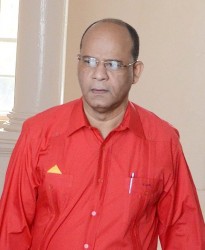General Secretary of the People’s Progressive Party Clement Rohee has accused this newspaper of colluding with the government to put the party and its supporters in a psychological mode of discomfort and hostility to the Venezuelan people through its publication of a 1964 plot by Venezuela to kidnap Dr Cheddi Jagan when he was government premier responsible for internal affairs.
The article was the lead in Sunday’s edition of the newspaper and was done from a document numbered 523 from Volume XXXI (South and Central America, Mexico) released by the Office of the Historian of the US Department some years ago.
Speaking at his party’s Freedom House headquarters yesterday, Rohee said that while on the surface the story appears insightful and informative it is really a “dangerous, mischievous, and deceitful piece of journalism as is the newspaper on whose pages it appears.”

He said the publication is another example of the close relation between the newspaper and the government which is allowing itself in this instant to be used as a vehicle to push a politically divisive and historically revisionist view of the relations between the two countries.
He pointed out that the newspaper admits that the information was available some years ago, but was brought to its attention by one of its correspondents. He insisted that the publication was published as part of a careful attempt to put the PPP and its supporters in a psychological mode of discomfort and hostility to the Venezuelan people to deem them unforgivable for this “unfriendly act.”
“Secondly, it is nothing but a bizarre attempt to place the blame on Venezuela and nowhere else for the removal of [Cheddi] Jagan and the PPP from government in 1964,” Rohee said.
The general secretary also claimed that the Stabroek News was provided with its start-up money from the Washington-based National Endowment for Democracy (NED) which was channeled to the founders of the newspapers through the Institute of North-South Issues. He said it is a small wonder why the newspaper would want to peddle such out dated information at this juncture when the relations between the two countries is taking a beating from both sides.
In her book Birth of the Stabroek News the newspaper’s former Sunday Editor Anna Benjamin wrote that while the NED had provided US$115,960 for the printing of the paper it was not used for any other expenses. The money, she said, was initially provided through the North-South Institute but later the grant was provided by the NED itself directly to the Trinidad Express, where this newspaper was printed at the time in 1987. At no point did any money come to Guyana or was handled in this country nor had the NED or the North-South Institute ever sought to influence the policy or editorial content of the newspaper.
The grant was obtained because the then Desmond Hoyte administration had said no foreign exchange could be allocated for the newspaper.
Rohee questioned whose interest the expose served and said this question must be answered by Stabroek News but his party is of the view that it is a clear attempt by the newspaper’s intellectual authors to re-open old wounds, push the PPP against the Venezuelan people and revise long established and recognised historical facts He said the publication of the information comes at a time that makes it deeply suspicious and “profoundly shady” and certainly not intended to promote good neighbourly relations between the two countries.
“It is a journalist expression of [President David] Granger’s effort to keep the cauldron boiling using the PPP as firewood for so doing,” he said adding that his party will remain vigilant to these subterfuges and intricacies and will exert every effort to prevent them from succeeding.
He said the expose has been published at a time when Guyana and Venezuela relations have reached an all-time low after many years of peace. He indicated that the nosedive occurred following the decree by the Venezuelan President, but said it was compounded by a series of blunders by this government in the economic sphere and the “belligerent and jingoistic postures adopted by the military dominated coalition government. “
Rohee advocated that a “people-to-people” initiative should be taken to deal with the controversy between the two countries and suggested that the universities in both countries get involved along with business people, journalists, non-governmental organisation (NGOs) and faith-based organisations.
“It can’t be only at a government-to-government level these relations are conducted. The people-to-people diplomacy plays a very important role in the promotion of good neigbourly relations between two countries…,” Rohee said.





